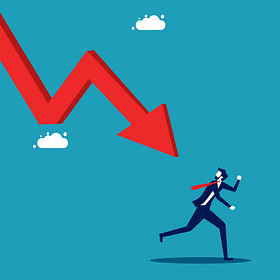Fool me once shame on you. Fool me twice shame on me.
I’m reticent to spend time talking of Mark Carney’s new carbon tax scheme, because it distracts from discussing much bigger dangers of returning the Liberal Party to power with or without Carney at its head.
However, after digging in briefly, Carney’s proposed changes seem little more than a shell game with continued negative consequences for Canada.
Carney pitched his dandy new plan on a Sunday CBC interview in his father-knows-best style - doing a masterful job pretending it’s really no big deal. Uninformed viewers could be lulled into forgetting the past ten years of Liberal net zero advocacy have brutally hobbled our economy - diverting domestic money, scaring away foreign investment and killing all the resource development he previously advocated against but now claims to support, while defocusing attention from all the other things we should have been doing. That same viewer could be fooled into thinking this is an innocuous new little venture he’s hatched up. Not so.
In selling this harmless little ditty, he has to breezily pretend that THE signature issue for which he is most known - his global and very vocal advocacy of Net Zero* - is suddenly kinda not a big deal, and that just a wee tweak in policy will make it all right as rain.
[*Mark’s past includes a green advocacy-driven tenure as Bank of England Governor, Board level involvement in the WEF, spearheading of ESG through his now-defunct GFANZ as UN Special Envoy on Climate Action and Finance, and his strong push against select free market areas that offended his climate change zealotry (notably Canadian pipeline building) while at Brookfield]
He’s pitching hard that his new scheme won’t directly impact consumers - and will JUST go after the “large polluters”.
Let’s first call BS on naming carbon dioxide as pollution. It is not. Carbon dioxide is a greenhouse gas necessary for photosynthesis in plants - or we’d all die. A majority is generated by nature (organic respiration, ocean release, soil respiration, volcanic activity, decomposition, wildfires, etc.) and some is created anthropogenically (this proportion is indeed increasing but remains unknown in volume and effect). CO2 comprises .04% (400 parts per million) of our atmosphere and Canada generates ~1.5% of global emissions.
With that out of the way, let’s examine 6 points of concern in Mr. Carney’s plan.
This carbon tax scheme will demand Canadian industries (who he deems as the “large polluters”) either reduce emissions to Mark’s desired levels, or buy offsetting carbon credits from carbon markets that remain underdeveloped and poorly functioning (by his own admission) despite three decades of trying to make them work. Part of Carney’s pitch is that his new policy will help further mature that market. For now I’ll set aside that the carbon market is, mostly, a steal from Peter to pay Paul routine that harkens to sinning freely on Saturday night, knowing you can receive absolution in church confessional Sunday morning. Net net - it changes nothing.
But the more important issue is that, oh goody, Canada is again being used as a gateway to pursue another ideologically driven global market experiment. The Canadian economy and consumers will suffer the impacts, while Mark and his big-head crew get to play with this fun global macro-economic project at our expense.
…and so history repeats.
He claims it will have little flow-through impact on consumer prices - for example, that charging steel makers carbon tax will have limited impact on the sticker price of a car. Hogwash. We should have zero confidence it will play out so simply in real life as we are never able to anticipate the unintended consequences when manipulating markets and financial systems, no matter what Mark’s fancy models say. Businesses always find a way to pass down costs.
For reference, here’s a past article on how computer models continue to be proven wrong, over and over again.
It entirely ignores that the world’s four biggest carbon producing industries - steel, plastics, ammonia and concrete (cumulatively consuming ~17% of global energy supply while generating ~25% of CO2 emissions) have been greening themselves like crazy the past years and mostly peaked out on how much more they can decarbonize (fossil fuels are needed as both feedstock and energy, so even if you “green” the energy production, there are few alternatives for feedstock). At this point mostly we’ll just punish these critical industries for producing the fundamental products we need, while they have few reasonable options to further reduce their carbon footprint.
Check out these two deep dive articles on the topic - the first examines decarbonization realities of Ammonia and Plastics, and the second digs into Steel and Concrete. You’ll be surprised at the harsh realities and how few levers can truly be pulled.
Challenging Net Zero and Climate Change | Reality Check Part 2
The underpinnings of Steel and Concrete.
What will be the potential of pushing more Canadian industries to the US when they are hit with yet another tax (aka tariff) and competitiveness is further hampered? Aren’t we supposed to be incentivizing industry to start and grow in Canada - not further precipitate the hollowing out of our industrial sector? So why levy yet another domestic tariff on ourselves while battling the damaging US tariffs, and this after we finally hear of a desire to eliminate our interprovincial trade barriers. It’s absurd. And for what?
Mr. Carney has also not openly discussed that his scheme will apply an import tariff (obsequiously named the “Carbon Border Adjustment Mechanism”) to all products that don’t meet his desired carbon cleanliness metrics. 70% of the world, including the US, doesn’t have a national carbon tax so untold products are unlikely to meet Mark’s demanding standards. We’ll be throwing a new cherry bomb into the tariff war and reviving the ideological Net Zero campaign in the process, this time through the back door. Hey - look over there!
Wonder how that will play with the US on top of everything else we’ll need to presumptively battle? - particularly as they are turning away from the net zero frenzy.
One thing is certain. We, the consumer, will be hit with the passthrough impact of higher prices from those import tariffs. And yet we’ll somehow still keep inflation in check and improve cost of living? See this National Post article for more on this topic.
Can you also guess who will be targeted as one of the largest polluters? You betcha - our oil, gas and mining industries - the very ones Liberals are now pretending they will embrace to encourage the energy development they previously killed. And will this be on top of the proposed 35% emission caps on oil & gas development, or instead of?
The hits keep on coming for our energy sector.
Want to know what I smell from this whole thing?
I see Mark Carney manufacturing a nifty new method to continue banging his green advocacy Net Zero drum, while playing fun macro-economic games where Canada is the pawn.
Who will benefit? It won’t be Canada, that’s for sure.
We need a return to basic economics and not pursuit of more ideological flights of fancy to further enfeeble us. We have ten years of proof the two are not compatible.
Stay tuned and stay pragmatic.









Mark Carnage. Carnage is what he’d bring to the Canadian economy. Do remember that Mark Carnage has been a key economic advisor to the Trudeau government as it worked to destroy our economy over the past nine years. On the evidence, it’s been piss-poor advice. Now he wants to be in charge, as the “outsider” who will bring “change” based on the advice from his own key advisors, Katie Telford and Gerry Butts. Hey, I think I’ve seen this movie already!
The problem as demonstrated already in Britain is that the net zero people do not listen to reason. We are dealing with a cult of zealots and climate change is just one aspect of their religion. It is a profitable venture with all the grants that can be had. The end goal is control. Why do you think they are pushing for 15 minute cities and EVs? It’s not to save the planet that’s for certain. Britain is in the course of closing Port Talbot steelworks with the loss of many jobs but it’s in the name of net zero.